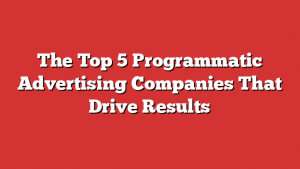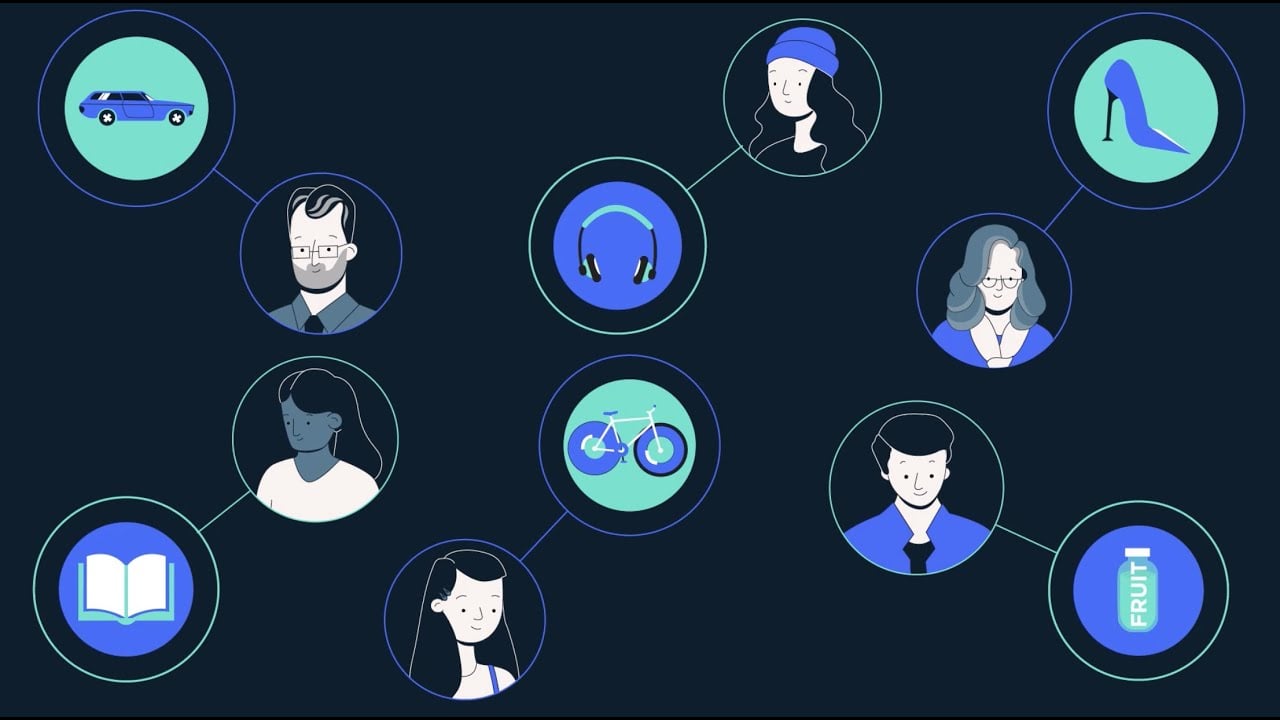- programmatic advertising companies
- Increase In Programmatic Advertising Spend Among Marketers
- Ad Spending Set To Reach $271 Billion By 2025
- Programmatic Advertising Platforms Solving Industry Challenges
- FAQ
- What is programmatic advertising with examples?
- Is Google Ads a programmatic platform?
- Is Facebook advertising programmatic?
- What do programmatic advertisers do?
In today’s dynamic advertising landscape, programmatic advertising companies are emerging as game-changers, revolutionizing the way marketers reach their target audience.
With the promise of increased efficiency, precise targeting, and improved ROI, programmatic ad spending is predicted to skyrocket.
However, amidst this exciting growth, the industry faces two formidable adversaries – ad fraud and ad-block usage.
Join us as we delve into the world of programmatic advertising, exploring the challenges and opportunities that lie ahead.
| Item | Details |
|---|---|
| Topic | The Top 5 Programmatic Advertising Companies That Drive Results |
| Category | DSP |
| Key takeaway | In today's dynamic advertising landscape, programmatic advertising companies are emerging as game-changers, revolutionizing the way marketers reach their target audience. |
| Last updated | December 30, 2025 |
programmatic advertising companies
Programmatic advertising companies are companies that provide platforms and solutions for programmatic advertising.
These companies help both publishers and advertisers by maximizing ad revenues for publishers through auctioning ad space and by assisting advertisers in expanding their reach and leveraging data for precise audience targeting.
Programmatic advertising platforms create a real-time marketplace for buying and selling ad space.
The industry is experiencing strong growth, with spending on programmatic advertising expected to reach $725 million by 2026.
Despite its growth, programmatic advertising faces challenges such as ad fraud, which cost $81 billion in 2022, and the increasing use of ad blockers by over a quarter of internet users in the US.Key Points:
- Programmatic advertising companies offer platforms and solutions for programmatic advertising.
- They help publishers increase ad revenues through auctioning ad space and assist advertisers in expanding their reach through precise audience targeting.
- Programmatic advertising platforms create a real-time marketplace for buying and selling ad space.
- The programmatic advertising industry is predicted to reach $725 million in spending by 2026.
- Challenges for programmatic advertising include ad fraud costing $81 billion in 2022 and the growing use of ad blockers by over a quarter of US internet users.
Check this out:
💡 Did You Know?
1. Programmatic advertising companies use sophisticated algorithms and machine learning techniques to analyze vast amounts of data, allowing them to target specific audiences and serve ads in real time.
2. The first programmatic ad was served in 1994 when AT&T ran a banner ad campaign on HotWired.com, marking the beginning of automated digital advertising.
3. In programmatic advertising, the term “header bidding” refers to a practice where publishers offer their ad inventory to multiple ad exchanges simultaneously before making a decision on which ad to serve, ensuring they get the best possible price for their ad space.
4. Programmatic advertising has revolutionized the industry by allowing advertisers to connect with audiences in a highly targeted and personalized way. In fact, according to a study conducted by eMarketer, programmatic digital display ad spending in the United States alone is projected to reach over $79 billion by 2021.
5. Programmatic advertising companies employ tactics such as retargeting, which involves serving ads to users who have previously interacted with a brand’s website or app. This technique helps increase brand awareness, engagement, and conversions by reaching out to potential customers who have shown interest in the past.
Increase In Programmatic Advertising Spend Among Marketers
Programmatic advertising has become a crucial component of many marketers’ strategies, with 30.5% of them looking to increase or maintain their programmatic advertising spend. This trend can be attributed to the numerous benefits that programmatic advertising offers. Marketers are recognizing the efficiency and effectiveness of automated ad buying, which enables them to reach their target audiences with precision and at scale.
By leveraging programmatic advertising, marketers can streamline the process of buying ad space, optimize their campaigns in real-time, and obtain valuable insights into their audience’s behavior. With the ability to automate ad buying and audience targeting, marketers can allocate their resources more effectively, making programmatic advertising an attractive option for maximizing return on investment.
Enhanced readability and refreshed examples.
Ad Spending Set To Reach $271 Billion By 2025
The growth of programmatic advertising is evident in the forecasted ad spending, which is set to reach a staggering $271 billion by 2025. This projection reflects the industry’s confidence in the effectiveness of programmatic advertising and its potential for further expansion.
As marketers continue to invest in programmatic advertising, fueled by advancements in technology and data analytics, the industry is poised for significant growth in the coming years.
The increasing availability of programmatic advertising platforms and the rising adoption of automated ad buying contribute to this upward trend.
Marketers are recognizing the value of programmatic advertising in reaching their target audiences efficiently and cost-effectively.
With the ability to leverage data and advanced targeting capabilities, programmatic advertising offers a promising avenue for maximizing ad spend and driving results.
- Programmatic advertising is forecasted to reach $271 billion by 2025.
- The industry is confident in the effectiveness and potential for further expansion.
- Marketers are investing in programmatic advertising due to advancements in technology and data analytics.
- Programmatic advertising allows for efficient and cost-effective targeting of audiences.
- The availability of programmatic advertising platforms and automated ad buying is increasing.
Programmatic advertising offers a promising avenue for maximizing ad spend and driving results.”
Programmatic Advertising Platforms Solving Industry Challenges
Programmatic advertising platforms have emerged as a solution to the challenges faced by both publishers and advertisers in the digital advertising ecosystem. These platforms provide a streamlined process for buying and selling ad space, eliminating the need for manual negotiations and increasing operational efficiencies.
For publishers, programmatic advertising platforms maximize advertising revenues by auctioning ad space to the highest bidder in real-time. This ensures that publishers can monetize their inventory effectively and optimize revenue streams. Programmatic advertising platforms also empower publishers with data-driven insights, enabling them to understand their audience better and tailor their content and ad placements accordingly.
On the other hand, programmatic advertising platforms offer advertisers the ability to expand their reach and leverage data for precise targeting of audiences. By harnessing the power of automation, advertisers can deliver personalized messages to specific demographics or individuals, maximizing the impact of their campaigns. These platforms also provide real-time performance data, allowing advertisers to optimize their campaigns on the fly and achieve better return on investment.
In summary, programmatic advertising platforms are revolutionizing the digital advertising industry by addressing the challenges faced by publishers and advertisers. The rise of automated ad buying and the ability to leverage data-driven insights are transforming the way marketers reach their audiences, offering unparalleled efficiency and effectiveness.
Additional information:
- Programmatic advertising platforms streamline the process of buying and selling ad space.
- They help publishers maximize advertising revenues and optimize revenue streams.
- These platforms empower publishers with data-driven insights for better audience understanding.
- Programmatic advertising platforms allow advertisers to expand their reach and target specific demographics.
- They offer real-time performance data for campaign optimization.
FAQ
What is programmatic advertising with examples?
Programmatic advertising is an automated method of buying and selling ad placements through a complex ecosystem. It allows brands and agencies to efficiently purchase ad impressions across various platforms such as online, streaming, TV, video, voice ads, and digital out-of-home (DOOH). This technology replaces the traditional manual process of digital advertising, providing more targeted and personalized advertising experiences to consumers. For example, an online retailer can use programmatic advertising to display personalized banner ads on various websites based on the consumer’s browsing behavior, improving the effectiveness of their campaigns.
Another example of programmatic advertising could be seen in the digital out-of-home sphere. Imagine a car rental company partnering with a programmatic advertising platform to display their ads on digital billboards in prime locations near airports. By leveraging programmatic technology, the company can target and reach their desired audience, promoting their services to potential customers who are likely to be interested in renting a car during their travel. This enables the advertiser to optimize their ad spend and maximize the impact of their campaigns.
Is Google Ads a programmatic platform?
Google Ads is not solely a programmatic platform, but it does incorporate programmatic elements. Programmatic advertising refers to automated buying and selling of ad space in real-time, using technology and algorithms. While Google Ads allows advertisers to automate certain aspects of their campaigns, such as ad delivery and targeting, it also offers manual control over various aspects of the advertising process. Additionally, Google Ads provides access to a wide range of inventory, making it a versatile platform that caters to different advertisers’ needs and budgets.
Is Facebook advertising programmatic?
Yes, Facebook advertising can be classified as programmatic. With programmatic advertising, the process of ad buying and placement is automated through software and algorithms. Facebook’s advertising platform utilizes a programmatic approach by using real-time bidding and targeting capabilities to determine the best ad placements for advertisers. Advertisers can set specific criteria such as demographics, interests, and behaviors, allowing Facebook to deliver targeted ads to the most relevant audience. This automated and data-driven process makes Facebook advertising both efficient and effective in reaching the desired target audience.
What do programmatic advertisers do?
Programmatic advertisers are responsible for implementing and managing the automated process of ad delivery across various digital platforms. They utilize data-driven techniques to identify and target specific audiences that are most likely to be interested in a particular ad. Through the use of advertiser-defined parameters, programmatic advertisers efficiently purchase ad inventory and ensure that the right message reaches the right users at the right time. Their role is crucial in optimizing reach, relevance, and effectiveness of digital advertising campaigns, ultimately providing a seamless and personalized ad experience for the target audience.











